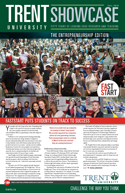
 |
 DURHAM IDENTIFIER
Exposing Canadian Identity What makes us Canadian? Why is the Timmy’s run a time-honoured tradition and where exactly did this fanatical passion for hockey come from? How is Canadianness a learned identity—pervasively passed down from the commercial and government powers-that-be in this country? Dr. Jim Cosgrave, assistant professor of Sociology at Trent University Durham uncovers the underlying factors contributing to Canadians’ reverence for their home-grown icons. His recently published book, Desiring Canada: CBC Contests, Hockey Violence and Other Stately Pleasures, serves as a revealing analysis of consumer-driven, mass-mediated society in Canada over the last 50 years. Co-written with fellow sociologist Patricia Cormack, the book examines how processes of national identity and state-formation occur at the everyday life level whether buying a coffee, watching the CBC, or heading to the local casino. “We are addressing the production of nationalist sentiments and desires, and the role the state plays in this production,” explains Professor Cosgrave. “The book addresses different kinds of pleasures, so part of our argument is that the state cannot only be an oppressor or regulator, it must also solicit desires in order to produce identification.” From Rick Mercer to Hockey Night in Canada “Nationalism is one method for producing identification – an example is the embrace of hockey as Canada's game,” explained Prof. Cosgrave. “The book is certainly about Canadianness. We wanted to analyze how it becomes an object of desire manifested in actual practices.” Desiring Canada received positive feedback both from academics and non-academic readers. It has garnered press coverage and was nominated for The John Porter Tradition of Excellence Book Award recognizing the advancement of sociological knowledge in Canada. Dr. Cosgrave is also grateful for funding and support received from the Symons Trust Fund for Canadian Studies for his research. From book to classroom In regards to his latest book, Prof. Cosgrave says, “the students found the book stimulating in terms of thinking about their own Canadianness and for their research projects.” |

































